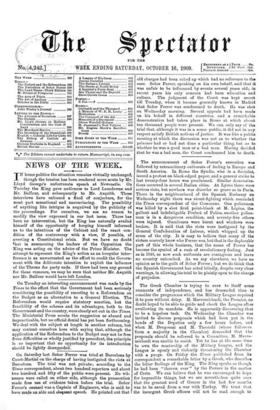The announcement of Senor Ferrer's execution was followed by extraordinary
outbursts of feeling in Europe and South America. In Rome the Syndic, who is a Socialist, issued a protest on black-edged paper, and a general strike to last twenty-four hours was proclaimed. Similar demonstra- tions occurred in several Italian cities. At Lyons there were serious riots, but nowhere was disorder so grave as in Paris. There in the neighbourhood of the Spanish Embassy on Wednesday night there was street-fighting which reminded the Times correspondent of the Commune. One policeman was killed by a shot fired point-blank at M. Lepine, the gallant and indefatigable Prefect of Police, another police- man is in a dangerous condition, and seventy-five others were injured. Omnibuses were burnt and windows were broken. It is said that the riots were instigated by the General Confederation of Labour, which whipped up the scum of the city. It is easy to believe that many of the rioters scarcely knew who Ferrer was, but that is the deplorable part of this whole business, that the name of Ferrer has become the symbol of a rush of revolutionary feeling. Just as in 1848, so now such outbursts are contagious and leave no country untouched. As we say elsewhere, we have no opinion as to the guilt of Senor Ferrer; but we do think that the Spanish Government has acted blindly, despite very clear warnings, in allowing his trial to be plainly open to the charge of prejudice.














































